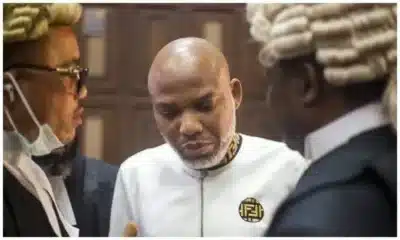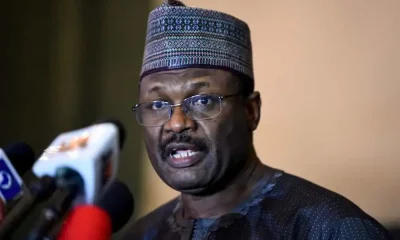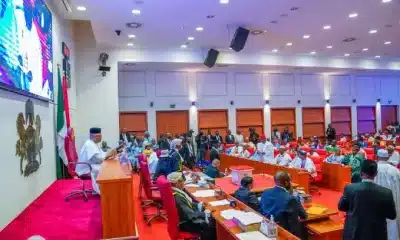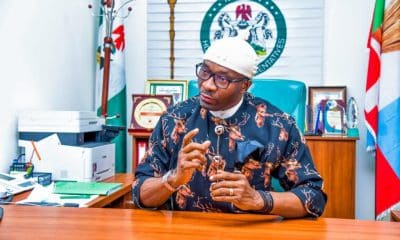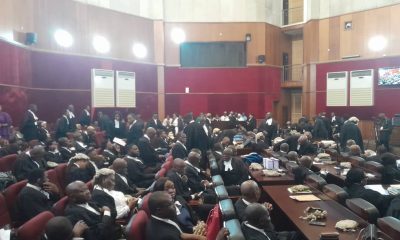Opinion
2019: Why Election Boycott Is Not An Option
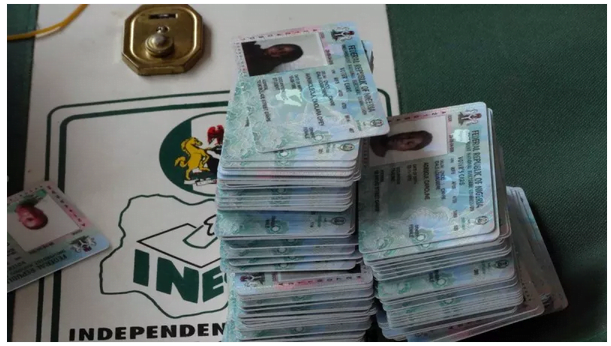
By Jude Ndukwe
While Nigeria is preparing for what is possibly the most important elections in her history, some citizens are attempting the suicidal option of an election boycott even at a time they have the best opportunity to make a very bold statement with their votes and at a time historical facts world over shows that election boycotts do not work and, in fact, is to the grave disadvantage of the boycotters. This is true considering that those who are calling for the boycott of the forthcoming Nigerian elections seem to actually be those in more desperate need of a change of government that has been tyrannical and oppressive to them; several of them have also lost their lives while agitating for their cause.
That Nnamdi Kanu is abroad today against his will is because we have a government that would not allow him associate freely or enjoy his other constitutionally guaranteed freedoms and rights. The first strategic step for him and IPOB to take is to make their number count in this election and vote out the government that has been repressive to them. In fact, the best vengeance they can and should exert on Buhari and his government is to head for the polls on February 16, thereafter, they could have the space to pursue their legitimate agitations decently and without being hounded by anyone.
But calling for an election boycott in a region where the president’s major challenger who also is a liberal democrat with listening ears has his brightest chances amounts to uncounted but very effective vote to the incumbent even before the elections kick off.
There must first be life before referendum. The need to stay alive is why Nnamdi Kanu fled Nigeria to other countries. Even he realizes the need to stay alive in order to fight for a deserving referendum. But when you have a man that is determined to crush you and your followers because of your beliefs and sociopolitical causes as president, the chances of you achieving your goals become very slim while your followers continue to remain endangered species in the land. There is no better time and opportunity to prove to Buhari that IPOB as an institution has the power to make kings and unseat presidents other than the 2019 presidential election. It would be the kind of statement that would further boost IPOB’s image before the international community as an institution of strategy that wields enormous powers that can change the course of a nation according to their own wishes any time, any day.
It was Matthew Frankel that said “…boycott itself is generally disastrous for the boycotting party. Individuals and parties tend to boycott elections in order to protest the policies of the ruling regime with the hopes that voters will choose not to show up, thus rendering the election illegitimate in the eyes of the world…this result is rarely achieved and the boycotting party often becomes completely detached from the organs of power, setting itself up for further setbacks”. This is an indisputable fact as the unlikely second coming of the incumbent in Nigeria would be far worse than what it has been in his first tenure when he needs the votes of the people to continue in office. If he could do this to the wood when it is wet, what would he not do when it is dry?
In 1992, Lebanese Christians boycotted the elections in their country despite controlling one-third of the parliament in order to protest excessive Syrian influence. This, unwittingly, gave the Shia Muslims in Lebanon the opportunity to increase their representation in parliament, an opportunity which the nascent Lebanese Hezbollah seized well to launch and assert themselves on the political scene of the nation with the grave consequences that followed.
The situation of election boycott proponents in Nigeria today is the same with that of Serbia of 1997 when Zornan Djindjic spearheaded the boycott of elections in that country. In the same vein, in the Southern Serbian province of Kosovo, a majority of Albanian voters who were also agitating for separation via peaceful means like IPOB is doing in Nigeria, boycotted that election. The effect of their boycott was that it allowed Slobodan Milosevic to gain more grip on power to the detriment of not only the boycotters but the entire nation as Kosovo eventually became a theatre of humanitarian crisis.
The Iraqi Muslims are now only just recovering from their ill-advised and ill-fated decision to boycott the Iraqi 2005 elections. The stories of regrets follow so many groups that have attempted to use election boycott as a strategy for achieving certain aims.
For example, with its large followership, and participation, IPOB could have massively influenced the outcome of the last Anambra election against the incumbent. They did not like him for whatever reasons, yet, they fluffed the chance to participate in a process that would have eased him out, and probably have their own preferred candidate, a sympathizer to their cause emerge victorious. And they take it from there. They did not want the incumbent, yet, they boycotted the chance to shove him out. Instead of seeing his face for only four years, they are now stuck with him for eight years. Who has lost?
The fact is that if Buhari wins the presidential election, IPOB members know that their leader, Nnamdi Kanu, has little or no chance of ever returning to Nigeria. But with Atiku’s presidency, the chances of Kanu not only returning but also being meaningfully and robustly engaged on matters agitating his mind and that of his followers would receive attention rather than oppression.
One can only imagine if a Senator like Enyinnaya Abaribe had not emerged a lawmaker via election, if everyone had boycotted the election that made him a Senator, who would have stood surety for Nnamdi Kanu when one of the bail conditions required that a Senator of the Federal Republic do so? By that singular fact, Nnamdi Kanu and IPOB have become the singular largest beneficiaries of a participatory electoral process and should have imbibed the lessons thereof.
So, it is to the advantage of not only IPOB but also all those who are direct or indirect victims of Buhari’s tyranny, incompetence and ineptitude that have led to massive job losses running into millions in the last four years, loss of thousands of lives to herdsmen’s murderous escapades without arrests and prosecutions but the making of excuses for the killers by government officials including the president himself, the blatant and unrestrained executive attacks on democratic institutions like the media and civil society, and other arms of government (judiciary and legislature), the flagrant disobedience of court orders leading to indiscriminate incarceration of citizens especially those in the opposition and with dissenting voices, absence of any robust economic policy which has led to the near-irredeemable crash of the local currency and the packing up of factories in droves, the on-going massive corruption, the cabal phenomenon, perpetual tension in the country created by official divisive statements and nepotistic actions by the president himself and his officials among other ills of this government, that they should drop the idea of election boycott and deal with the present existential threat to their own survival first through the ballot and move on to other issues from there.
This advice is not only to IPOB but also to all those victims of presidential apathy, executive excesses and recklessness of this administration that has also led to the sacking of communities by murderous elements in the Middle Belt States of Plateau, Benue, Nasarawa, Kogi etc, and northern states of Kaduna especially as it affects Southern Kaduna, Zamfara, Katsina etc. We must all overcome political lethargy imposed upon us by the harsh realities of this administration, and get motivated to go out and vote by the fact that our collective beleaguered situation will be worse off if the current crop of leaders are allowed to continue in office beyond May 29, 2019.

